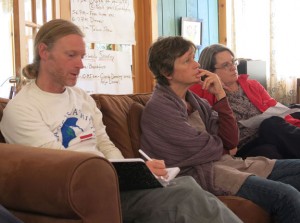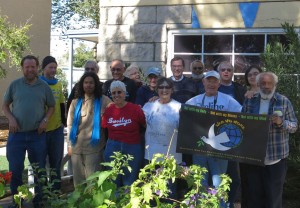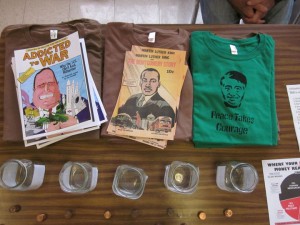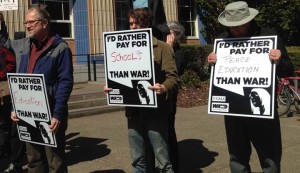More Than a Paycheck,
REFUSING to PAY for WAR
December 2015/January 2016
Contents
- Building Partnerships During Tax Season

- Student Debt and War Tax Resisting
By Justin Becker - Counseling Notes Highway Bill and WTRs • A Bit of Good News • W-4 Questions and IRS Enforcement • “Last Known Address” for IRS Notices
- Many Thanks to everyone who supports NWTRCC with their volunteer time or financial donations and to the following groups for recent donations
- Network List Updates
- International Jailed for Tax Refusal
- War Tax Resistance Ideas and Actions The Talkin’ Resistance in Amherst:
New England WTR Gathering • Out and About with War Tax Resisters • Spain Court States Familiar Argument - Resources Let’s Get Ready for Tax Season! • WTR Books On Sale • Opportunities Abound • Recently On Our Blog
- NWTRCC News WTRs Win in Las Vegas
- PROFILE Partnership in a Community Property State
By Matt Niznik; Oakland, California
Click here to download a PDF of the December/January issue
Building Partnerships During Tax Season
Why wait until tax day to talk about war tax resistance? A group of activists in the NWTRCC network, with NWTRCC‘s support, are piloting a project to form partnerships at the local level starting in January to build toward larger actions on Tax Day, which is Monday, April 18, 2016. A committee brought a proposal to the November 8 NWTRCC meeting to explore new ways to make our call to refuse to pay for war relevant in current movements. The hope is that each of us will begin to work with at least one new group and develop a relationship that integrates war tax resistance with other issues. How these pilot actions go will help shape a more coordinated campaign in 2017. Here are some of the pilot projects in development for 2016:
-
In Corvallis, Oregon, Bill Glassmire has been involved with his local chapter of the climate change group 350.org. He gave a proposal to group members that would combine even a small level of tax refusal with redirection to develop a continued on page 7 mutually agreed upon project to further their work. This has already resulted in new conversations about war tax resistance.
- Peter Smith reports that Michiana War Tax Refusers will have a penny poll and literature table at the local Martin Luther King Jr. Day celebration. They will visit other tables and talk to organizers about a tax day partnership.
- In Maine, Jason Rawn has put his artistry together with his activism and created “Melty” postcards (below) for outreach about what will happen if people don’t “Divest from the Pentagon.”
- In San Diego, Anne Barron is thinking to emphasize war tax resistance as civil disobedience and tie it to the civil rights strategies of the 1960s. She will investigate partnerships at King Day events locally.
Tax day is on April 18 this year because of the Emancipation Day holiday in Washington, DC on April 15.
See Resources on page 5 for more information and ideas.
Student Debt and War Tax Resisting
By Justin Becker
War is what makes all I study in my education so real and so pressing, beginning with a psychology paper on the Lucifer effect, which shows that in a position of power, humans can become corrupt and start torturing prisoners of war, and moving to readings about the environmental destruction that is caused by war. These things, in my conscience and in my education, are saying “Do anything you can to fight nonviolently against war.”
I refused to sign up for the Selective Service. I have been a pacifist since age thirteen, attended a Quaker school, and joined antiwar protests. I recently began war tax resisting. But education — the very thing that teaches me so much about the evils of war — is a threat to my conscience because I do not know how long I will be able to resist war taxes. Student loan debt might end my war tax resistance.
Today you hear millions of young people complain about the student loans they have to pay off. Each year students face the choice: more debt and another year of education, or stop taking classes, go to work, and start paying the debt back. Some students attend graduate school just to postpone repaying their undergraduate loans right away. But more education means more debt, bills, and stress.
I will owe the federal government at least $16,000 when I leave college, and I am expected to begin paying it back six months after I graduate. That leaves little time to rest, find a place to live, a job, and become established in my career. For many that means abandoning their dreams and taking any job that pays decently so they can clear their debt. With minimum wage below $10 an hour in many states, even with a federal loan at a fairly low interest rate, repayment can take a long time. If students take any job because of the fear of debt, bankruptcy, or jail, then there is no way for them to follow their conscience and participate in something like war tax resistance. No student with at least $16,000 in debt wants to start picking fights with the IRS. This is a battle that I am worried I am going to lose.
To makes matters worse, over the next decade the federal government is projected to make $127 billion in profit off student loans, some of which will go back to the Pentagon to fund the very thing I went to college to learn how to end.
Right now, 40 million people owe $1.2 trillion dollars to the federal government. A year or two of military spending could wipe out that debt. The National Priorities Project estimates that the Department of Defense budget of $505 billion (not including war spending) could offer $8,300 to 15 million college students for four years. The spending on war is denying low cost or free higher education, which is essential to the growth and sustainability of our world.
Is the next step to resist paying our debt? Maybe, although there are some ways to get out of debt, such as working for a nonprofit (approved by the feds) for ten years.
It has become hard for young people to do this act of war tax resisting. By the time they pay their debts, they could own a house or a have a family and not want to put them at risk. For many reasons, war tax resisting is harder, but at a time where we are spending more money on war than ever before, we must put our fears aside as students and resist this corrupt war driven system.
Justin Becker is a student in peace studies at Sarah Lawrence College and working part-time in the NWTRCC office during the fall 2015 semester.
Counseling Notes:
Highway Bill and WTRs
A highway funding bill in Congress has been in the works for a while, and at this writing Senate and House versions are being reconciled. A vote is expected by December 5. The bill includes various revenue-related provisions involving the IRS, and unfortunately at least two of these may impact war tax resisters.
Private Debt Collectors: Despite past experience and the current plague of scammers claiming to work for the IRS, Congress wants to farm out some tax collection to private companies. The union representing IRS employees is against the provision, but it is expected to pass. House Ways and Means Committee member John Lewis and others spoke strongly against the provision: “It is misguided and harmful to taxpayers to use private debt collectors to collect outstanding tax liabilities. When the IRS most recently used private debt collectors in 2006, the program actually lost money.” It seems this on-again/off-again experiment has little to do with collecting taxes, but more to do with a tug-of-war between Democrats and Republicans on whether to use tax dollars to reward Democrat-leaning public employee unions or Republican-leaning government contractors — or those from either party who owe a favor to some debt collection companies.
Passports Denied or Cancelled: This provision would add a new section 7345 to the tax code, titled “Revocation or Denial of Passport in Case of Certain Tax Delinquencies.” Controversial in the past, this time there seems to be little opposition. If it does pass, the State Department could block renewal, issuance of new passports, or possibly rescind passports of people with more than a $50,000 tax debt (including interest and penalties) and the IRS has filed a notice of lien. Watch our website, the news, and our next issue for updates on these provisions.
A Bit of Good News
The IRS announced in October that levies will no longer be issued on Social Security Administration (SSA) Disability Insurance Benefits. While the IRS has the power to levy 15% of Social Security benefits under the Federal Payment Levy Program (FPLP), a recent policy decision was made to exclude disability payments from such levies, effective for amounts payable after October 5, 2015.
W-4 Questions and IRS Enforcement
One WTR starting a new job wondered how to fill out the worksheet on the W-4 form. He was trying to figure out how to declare enough allowances to be able to resist taxes at the end of the year but not raise questions with the employer. Response: you only need to turn in the bottom part of Form W-4 for payroll purposes. The employer does not see the worksheet, nor do they need to know how you came up with your number of allowances.
Another WTR in a salaried job recently received a letter from the IRS which starts off:
We believe you submitted an incorrect Form W-4, Employee’s Withholding Allowance Certificate, to your employer.
What you need to do: Visit www.irs.gov and search keyword “withholding calculator”
to determine the proper amount of federal income tax to be withheld from your wages.
Immediately provide your employer with a corrected Form W-4….
And if you don’t? The IRS may send a “lock-in” letter to the employer instructing them to begin withholding based on the individual’s marital status, and they could assess a $500 penalty. The WTR who got the letter wondered how long it would take for the IRS to issue a lock-in letter or if she would be in more serious trouble if she does not reply. We don’t hear much from our network about this sort of letter, or how often the IRS sends a lock-in letter to employers, or whether anyone has gotten a penalty for inflated allowances. Please contact the NWTRCC office if you have had any of these consequences for W-4 resistance.
“Last Known Address” for IRS Notices
WTRs often call after receiving a bank account or salary levy saying they did not receive an “intent to levy” notice from the IRS and wondering if this is grounds to argue the levy. Often the individual has moved a few times. Official IRS policy is that they mail to a taxpayer’s last known address, which to them is the address that appears on the taxpayer’s most recently processed federal tax return. The exception is if the taxpayer has contacted the IRS directly with a new address. The IRS does not regard addresses on W-2s or 1099s or contact with another government agency as “clear and concise notification.” Courts seem to respond inconsistently to cases involving notices not received. Generally they side with the IRS‘s strict definition of last known address, although a district court in Georgia sided with the taxpayer in one case, saying that the IRS definition does not immunize IRS from using common sense. IRS must exercise “reasonable diligence in determining the last known address.” In this case returned mail and newer correspondence from the taxpayer indicated her correct address. But challenging the IRS in court even on this kind of issue is time-consuming, costly, probably bucking the odds, and might delay but is unlikely to stop their collection efforts.
— Checkpoint Newsstand by Thomson Reuters
Thanks to David Gross for contributions to this column.
Many Thanks
Special thanks for the grant from
The Kathy Yoselson Fierce Determination Fund of The Community Foundation in Ithaca, New York
Affiliate fees, support from alternative funds, and individual donations are a fundamental part of NWTRCC‘s durability. We are grateful to everyone who is responding to our recent fund appeal and to these groups who have paid their affiliate dues:
Episcopal Peace Fellowship
Michiana War Tax Refusers
Nonviolence International
Voices for Creative Nonviolence
War Resisters League National Office
And special thanks to Las Vegas Catholic Worker for hosting the November 6-8 NWTRCC gathering and meeting.
Network List Updates
The Network List of Affiliates, Area Contacts, Counselors, and Alternative Funds is updated and online at nwtrcc.org, or contact the NWTRCC office (nwtrcc@nwtrcc.org or 1-800-269-7464) if you would like a printed list by mail.
Consider a Bequest
NWTRCC accepts bequests, which can be arranged through your will or other estate plan. Simply name NWTRCC as the beneficiary of a portion of your estate or of particular assets in your estate, or contact the NWTRCC office for arranging a bequest through one of our 501c3 fiscal sponsors. A bequest costs nothing now, yet it may give you great satisfaction to know that your gift will live on in NWTRCC. More information: (800) 269-7464 or nwtrcc@nwtrcc.org.
Don’t forget, you can find us on
Facebook • Twitter • YouTube • Pinterest
and join our discussion listserve
Click on the icons at nwtrcc.org
Advertising rates for this newsletter can be found at nwtrcc.org/ads.php or contact the editor at (800) 269‒7464.
INTERNATIONAL
Jailed for Tax Refusal
Christopher Coverdale, a retired lawyer living in Rye, England, stopped paying his council tax on the grounds that to pay it would be to support government-sponsored terrorism in the form of war. The council tax is collected locally, similar to a property tax in the U.S.

Chris Coverdale, right, with Roger Franklin, another British war tax resister who was jailed (in 1995 and 1996) for refusal to pay taxes to fund the British government’s possession of weapons of mass destruction. International Conference of War Tax Resisters and Peace Tax Campaigns, Manchester, England, 2008. Photo by Ed Hedemann.
Coverdale has refused to pay more than £1,800 so far, believing British taxpayers and government bodies at all levels are responsible for ongoing criminal acts of war. However, according to the Rye and Battle Observer, “Coverdale’s argument that council tax funds terrorist actions had been deemed ‘without merit’ by the High Court and the Court of Appeals.” Coverdale’s legal fight has been going on for more than a year, and on October 7, 2015, he was sentenced to 42 days in jail. He was released on November 18.
“I have never refused to pay tax but I am refusing to commit an illegal act: to hand over money for the purpose of terrorist actions,” said Chris Coverdale, who has been active with the Stop the War Coalition in the United Kingdom and founded the Campaign to Make Wars History.
Coverdale sent the following letter to his local council last year. It is posted at makewarshistory.co.uk, with the encouragement that others pursue this protest.
Dear Councillor,
Paying tax is a crime when the money is used to wage illegal war. I am writing on behalf of a group of residents to ask for your help on a matter of concern to all of us. We were recently informed that we are committing crimes by paying council tax. Apparently the collection and payment of tax is a crime if the money is used to wage illegal war or engage in acts of terrorism. When we asked whether this law applies to council tax, we were told that it applies to all taxes and all payments that end up in the hands of the Government or its agents while it is taking part in warfare or acts of terrorism.
We are law abiding citizens and we are horrified by the thought that we may be committing crimes, so I am writing to ask you to investigate the truth on our behalf. We need to know: Are the allegations true? Do the Terrorism Act, the International Criminal Court Act and the Rome Statute apply to the payment of tax? Are the wars and the deaths of Afghan, Iraqi, Libyan and Syrian civilians legal or illegal in international law? Can taxpayers be prosecuted for aiding and abetting war crimes? We need answers to all these questions.
We have been advised that the safest thing to do in this situation is to suspend further tax payments until we know for certain that it is not a crime. I’m loathe to stop paying tax as I don’t want to affect the essential services provided by the council, but if it’s true that paying tax renders us criminally liable as accessories to genocide I must withhold all payments until the Supreme Court confirms that the crimes have ended and we won’t be prosecuted. So please investigate the truth of these allegations and let us know when we can safely resume tax payments without bearing legal responsibility for funding the Government’s wars and the deaths of innocent men women and children.
Yours faithfully
A Resident
With the letter he enclosed various documents, including text of sections from The Terrorism Act 2000, The International Criminal Court Act 2001, Judgement of the Nuremburg War Crimes Tribunal 1946, and other documents. l
Links to news stories about Coverdale’s war tax resistance, his Make Wars History campaign, and a video interview are on the NWTRCC blog. Click the blog link at nwtrcc.org and see the November 4 post.
Thanks to David Gross and Erica Weiland for information in this article.
War Tax Resistance Ideas and Actions
The Talkin’ Resistance in Amherst
New England WTR Gathering

Frida Berrigan read from her book and answered questions about family life and resistance. Photo by Ruth Benn.
War tax resisters, supporters, and friends gathered for the 30th time in 30 years — an impressive record. A persistent if changing group of resisters has planned gatherings large and small over a fall weekend each year since 1985. The themes, topics, and discussions will sound repetitive to many: how do we build nonviolent resistance to war; how do you resist war taxes; what’s the best way to sustain resistance; what kind of street actions have you done; etc. etc. But each year offers up a new angle on these topics.
This year Frida Berrigan started the weekend off on Friday night. She read from her book, It Runs In The Family: On Being Raised by Radicals and Growing Into Rebellious Motherhood, and the discussion tended toward parenthood, the ups and downs of radical activism and raising children in a consumerist (and war) culture. She and her two siblings never rebelled from growing up in a household where war resisting parents, Philip Berrigan and Liz McAlister, periodically spent months at a time in jail. (Frida notes that if she or her siblings had rebelled and chosen careers in corporate America they would probably be famous; the media loves that kind of story.)
Despite being deprived of fancy toys and clothes and family vacations to Disney World, and instead having to spend time writing her dad in prison or protesting at the Pentagon, Frida always understood that “it was part of something bigger, there was a serious reason why we lived this way.” The power of “living your values” is an important message to relay to hesitant resisters who worry about the effect on their family members.

Jason Rawn, helped organized the weekend and concentrates on the discussion with Margaret (center) and Ginny. Photo by Ruth Benn.
The turnout for Saturday and Sunday was small but committed. Some of the most lively discussion involved making plans for the 2016 gathering with elements designed to increase attendance such as partnering with other organizations and having the keynote talk on Saturday night so that more people would come for the daytime workshops too. We learned about a new program at the University of Massachusetts-Amherst, Resistance Studies Initiative, and hope to find a way to support and link to this program. We also had plenty of time to talk about our war tax resistance, troubleshoot problems, offer a workshop for newly interested people, and take some walks.
As usual we had great food, provided by Joanne and Rick of Pacifeast Catering. And the beautiful location — nearly at the height of leaf-peeping season — was Pioneer Valley Co-Housing (Massachusetts). Thanks to Henry Lappen and the community for hosting the gathering, and to Daniel Sicken and Jason Rawn for their work in pulling it together.
—Ruth Benn
Out and About with War Tax Resisters
- School of the Americas Watch held its annual vigil in Fort Benning, Georgia, over the November 20 – 22 weekend. Robert Randall and Mary Regan staffed the NWTRCC literature table at vigil sites and at the convention center workshop site and got help from Joan Noyce and Frank Donnelly. Robert reports that it was a “really good weekend” with good interest in war tax resistance. Saturday included a march and rally to shut down the Stewart Detention Center in Lumpkin, Georgia, where more than 1,000 immigrants are detained in the privately run ICE facility. About 1,400 demonstrators gathered in the town of 1,200 and heard speeches by family members of detainees or deportees. Eleven were arrested for crossing onto the property. In 2016, SOAW is planning to move their action to the border, but the exact location has not been set. See more at soaw.org.
- At the Western District Conference of Mennonites (Kansas and Oklahoma) October 30-31, members of Heartland Peace Tax Group offered literature on both tax resistance/diversion and the Peace Tax Fund. There was interest in our six-poster display showing the history of war tax resistance for the last 23 centuries. We suggested a 25 cent donation for the seven revised NWTRCC “how to” booklets and a dozen were “sold” and taken along with the free items. In November 2015 Daniel Riehl and I had letters in our national Mennonite publication proposing war tax resistance and ways we do it. After local discussions, articles in denominational publications, workshops and proposed resolutions at various Mennonite gatherings since the Vietnam War, war tax resistance is still a minority activity among Mennonites but alive and persistent.
- — Stan Bohn, Newton, Kansas
- Upcoming opportunity: CodePink is promoting a civil disobedience (CD) contingent at Democracy Spring action to get money out of politics. The CD will focus on corporations fueling the military industrial complex and is projected to be in April. Imagine: If corporations fueling the military industrial complex could no longer buy off our elected officials, we could end war. War tax resisters are looking into participating with a tax day tie in depending on the final dates for the action. Contact the NWTRCC office if you are interested in joining other WTRs, and see codepink.org to pledge your participation.
Spain Court States Familiar Argument
The High Court of Valencia recently declared that Spanish citizens do not have the right to withhold tax payments for reasons of conscientious objection to military spending. They used an argument that is familiar to war tax resisters and peace tax campaigners here in the U.S. — that taxation cannot be determined by individual ideology, and election of representatives is the way to influence tax policy.
Resources
Let’s Get Ready for Tax Season!
The IRS puts out the new tax forms in January and begins its PR campaign that “bad things will happen if you don’t pay your taxes.” So it’s important that we grab their coattails and do more outreach starting in January too. NWTRCC has flyers, brochures, cards, and booklets that we advertise to our network regularly, but we also hope to offer some new materials for the coming tax season and the pilot outreach campaign mentioned on page 1.
 What do you need to enhance your outreach in 2016?
What do you need to enhance your outreach in 2016?
Do you have ideas for flyers or banners but need help producing them?
If we produced posters like the ones pictured on page 7 and offered them for free, would you use them?
Would some financial support help you do more this year?
NWTRCC‘s commitment to the pilot project building toward tax day is to help however we can, with templates on our website, as much free lit as we can afford to give, and financial help to the extent that an approved $2,000 total in funding will allow.
In addition, NWTRCC is creating new ads like the one above for both print and online to tie in with tax season actions. Ads will be available in color and black and white versions, downloadable from our website or by mail.
Please contact the NWTRCC office with your ideas or needs: PO Box 150553, Brooklyn, NY 11215, 800-269-7464, nwtrcc@nwtrcc.org.
WTR Books On Sale
$6 each, postpaid from NWTRCC
War Tax Resistance: A Guide to Withholding Your Support for the Military is on sale to clear out the balance of copies left in the War Resisters League office and held by NWTRCC. Published in 2003, it includes a 2015 update insert and is still a comprehensive resource for the ins, outs, whys, hows, history and organizing of this form of war resistance. Contact the NWTRCC office about low-cost bulk orders.
Opportunities Abound
NWTRCC maintains a list of upcoming conferences, progressive festivals, events and actions online at tiny.cc/nwtrcc. If you see something on that list in your region that you would like to attend and could table at for NWTRCC, we’ll help pay fees and get you a box of literature. You can also add to that list. Try to post things well in advance so that we have time to reserve a table and send out literature. Thanks!
Recently On Our Blog
“Refusing the Legacy of Thanksgiving” by Erica Weiland
“On Armistice Day, Remember: Wars Cannot End Wars” by Susan Miller
“Dear Rick Steves – Could You Be a War Tax Resister? by Erica Weiland
“The Snowden Model and Finding Our Power” by Ruth Benn
“After Roseburg: On guns big and bigger” A letter to the editor by John Stoner
“Driving Ms. Frances” a story by Ralph Dolan
“Longest Jail Time for a War Tax Resister” by Ed Hedemann
Find our blog postings at nwtrcc.org.
NWTRCC News
WTRs Win in Las Vegas
By Ruth Benn and Erica Weiland
 On November 6-8, a stalwart group of war tax resisters met at the NWTRCC gathering in Las Vegas for community, discussion of outreach tactics, and a vigil outside Nellis Air Force Base. It was a fun and productive time, which is more how we define “winning” than the traditional definition in Las Vegas. However, Vegas is a rather interesting place when you see it from the angle of our great hosts at Las Vegas Catholic Worker.
On November 6-8, a stalwart group of war tax resisters met at the NWTRCC gathering in Las Vegas for community, discussion of outreach tactics, and a vigil outside Nellis Air Force Base. It was a fun and productive time, which is more how we define “winning” than the traditional definition in Las Vegas. However, Vegas is a rather interesting place when you see it from the angle of our great hosts at Las Vegas Catholic Worker.
NWTRCC‘s Administrative Committee met on Friday to review agenda items and plan the Sunday Coordinating Committee meeting. Before dinner we had time to take a walk around the Westside neighborhood, seeing beautiful murals of prominent African-Americans in the history of Las Vegas and taking a tour of Harrison House, which was a boarding house for black performers during the 1940s and 1950s when the very places they performed would not allow them to stay the night. The house is now being restored and is a stop on the Pioneer Trail, a walking tour of the Historic Westside.
On Friday night, Jennifer Carr, a professor at the University of Nevada-Las Vegas Boyd School of Law, shared her analysis of the Religious Freedom Peace Tax Bill. Her article, entitled “Complicity and Collection: Religious Freedom and Tax,” makes suggestions about changes that could make the bill more palatable to Congress and other skeptics. Her talk was recorded and will be shared on the NWTRCC website soon.
We spent Saturday morning talking about new ideas for war tax resistance presentations and convening our usual WTR 101 and 102 sessions. After lunch, a small group met to follow up on Jennifer Carr’s talk, while others discussed ideas around the proposal for NWTRCC to support affiliates in organizing Tax Day outreach events (see page 1). One major topic of conversation was the need to make connections with other groups and to meet prospective resisters where they’re at. Climate change, antipolice brutality, and community activist organizations were some of the groups mentioned as possible connections.
We had debated about where to do our planned vigil in the afternoon. Creech Air Force Base, from where drones are tested and piloted, and the Nevada Test Site were just a bit too far from Las Vegas to fit it into our schedule. We settled on Nellis Air Force Base, where some nuclear weapons are kept (“neither confirmed nor denied” by the authorities). Our unannounced vigil drew the attention of base security and local police, but went strong for about an hour, until the encroaching darkness drove us back indoors for dinner. Thanks to the Nevada Desert Experience staff for providing guidance and signs.
Our Sunday morning business meeting approved a 2016 budget and list of objectives, as well as proposals for some updates to our organizational handbook and support for pilot projects this tax season. The group did not pass a proposed new logo. A committee formed to develop a WTR comic book proposal with specific ideas for the May meeting, and the group endorsed Campaign Nonviolence, a coalition of peace and justice groups sponsoring nationwide conferences and actions.
Jennifer Carr’s talk, a couple of discussions on Saturday, and the business meeting were open to remote listening and participation from members of our network, and we had several folks join us throughout. We will continue to provide a “virtual meeting” option at future gatherings that can be accessed by phone or computer. Virtual participants comment and join the consensus decision-making. We know that travel is costly and problematic, so we hope that you will join us from home if you cannot be at a gathering in person.
Look under the “Gatherings” link on our website for more photos and reports and a link to Jennifer Carr’s talk when it is available.
Ruth Benn is NWTRCC‘s Coordinator. Erica Weiland is NWTRCC‘s Social Media Consultant.
PROFILE
Partnership in a Community Property State
By Matt Niznik; Oakland, California
Editor’s note: This is one essay in the newest booklet in our “Practical War Tax Resistance” series. “Relationships and War Tax Resistance” is #8 in the series and is due to be published by January 6, 2016. Copies will be $1.50 each or contact the office for bulk orders. The text will be posted at nwtrcc.org.
My partner Rose and I have been together for 32 years, since we met during senior year of college. Although Rose does not define herself as an activist, the movements I was involved in around that time — anti-apartheid, solidarity with Central America liberation, opposing militarism, support for political prisoners in the U.S. — have been and continue to be an important part of our relationship and consciousness, especially as we have raised two politically aware children.
Since 1987, I have refused to pay any federal taxes and have not filed returns. Both Rose and I have been at our current jobs at nonprofit organizations for the past 21 years and, since I work at a place where I’m fairly easy to find, I feel lucky that I never heard from the IRS until 2007. They garnished my wages at that time, but only collected on me for the three years prior to that. I’m even more fortunate that the WTR Penalty Fund was able to assist with most of the penalties and interest from that collection.
Although we are not married, since we live in a community property state we have always kept our finances separate. When we bought a car, it was in Rose’s name. When we purchased property along with four other cohousing families, the title for our home has her name on it, and I’m not mentioned in the Tenancy in Common agreement at all. When we created our wills, mine gives everything to Rose, whereas hers gives everything to our kids. As you can see, there is a lot riding on my trust in my partner, and in my two children should Rose pass away before me! Luckily, the four of us have strong bonds, built over many years of open communication about my war tax resistance and our (mostly) shared worldviews.
There have been interesting challenges. Our son decided not to register for the draft, so we helped him through public college without any financial aid. Our daughter attended a private college that was more expensive and, though she received a scholarship paying half the cost, she needed assistance for the rest. For four years, Rose filled out all the financial aid paperwork — a very arduous task! — based solely on her income.
The most challenging time for our family was 2008. To celebrate 20 years of WTR, I sent out a letter to over 100 friends and family members, updating them on my resistance. Unfortunately, a brother-in-law of Rose, who used to work for NATO and the GAO, and did not previously know about my WTR, got hold of the letter and caused a huge uproar on that side of the family. He wrote nasty letters and emails, reported me to the government, and contacted the directors of the agency I work for, demanding I be fired. There were lots of difficult moments for Rose and me.
Thankfully, one of her sisters was very supportive of us, and we have managed to slowly patch things up with the extended family through the years. Once people found out what the brother-in-law had done, he became very unpopular. Throughout this experience, support from the WTR community has been crucial to our family’s peace of mind and to my continued resistance.



